牛津译林版9下Unit2Grammar江苏省永丰初级中学九年级下册英语公开课课件(31张)
文档属性
| 名称 | 牛津译林版9下Unit2Grammar江苏省永丰初级中学九年级下册英语公开课课件(31张) |  | |
| 格式 | zip | ||
| 文件大小 | 770.5KB | ||
| 资源类型 | 教案 | ||
| 版本资源 | 牛津译林版 | ||
| 科目 | 英语 | ||
| 更新时间 | 2022-05-19 15:51:45 | ||
图片预览

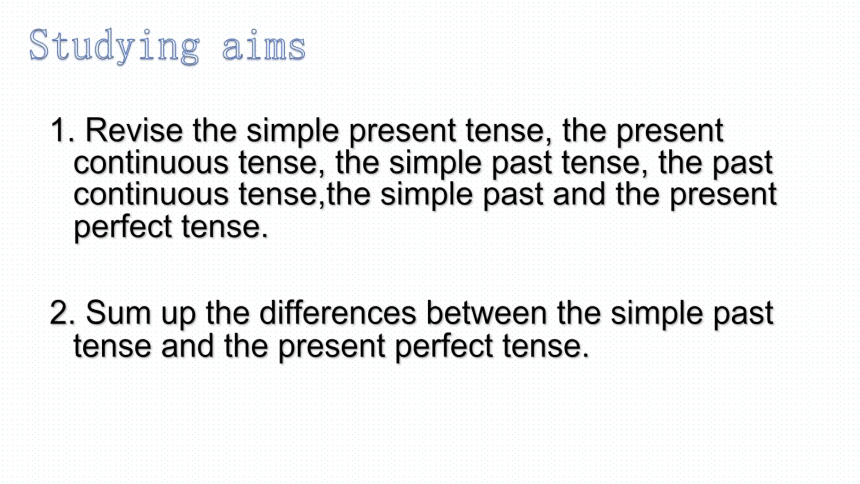
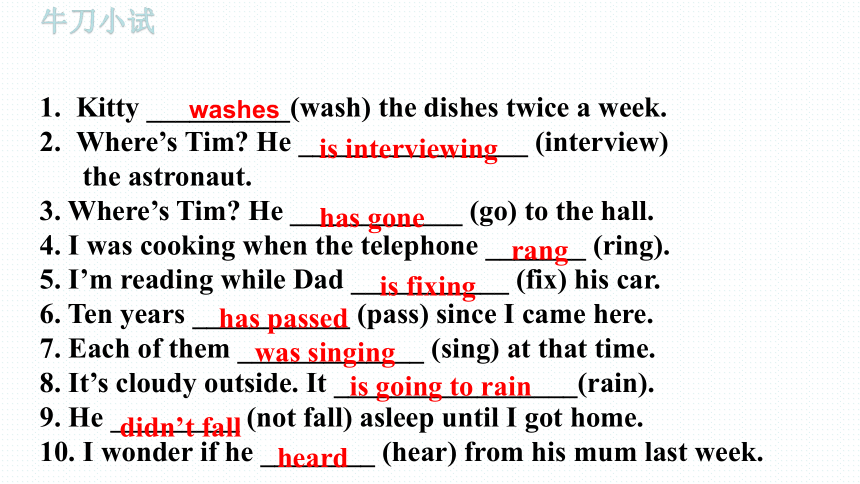
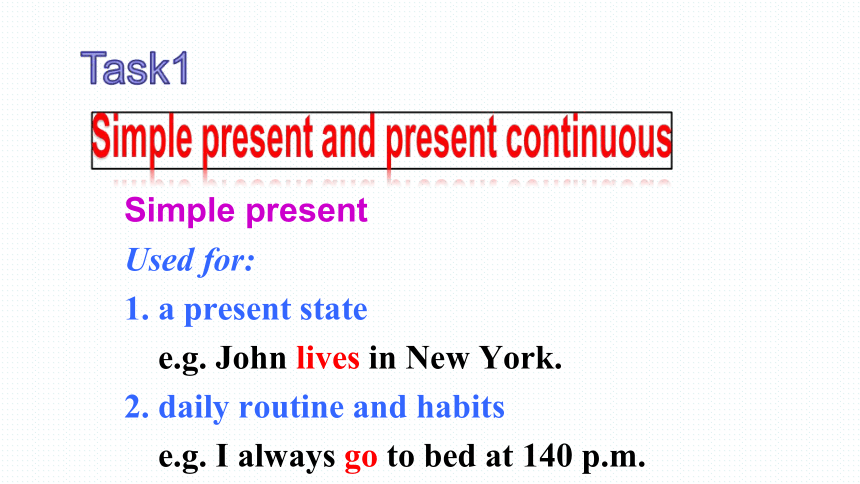
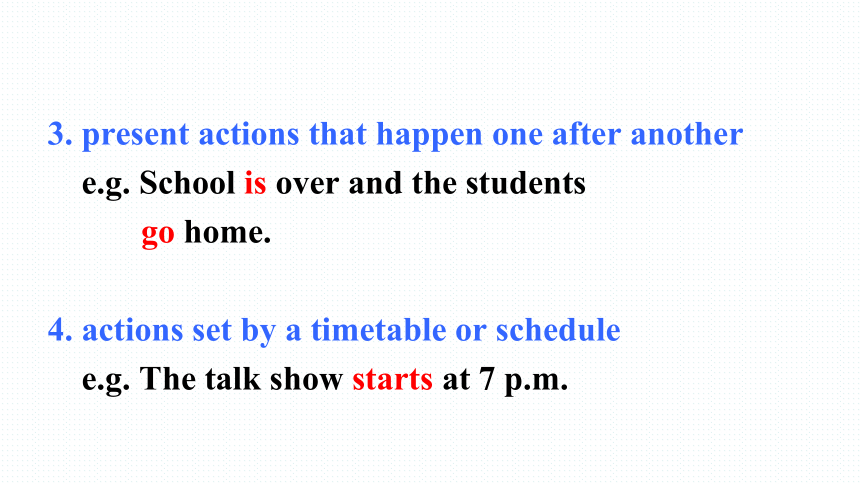
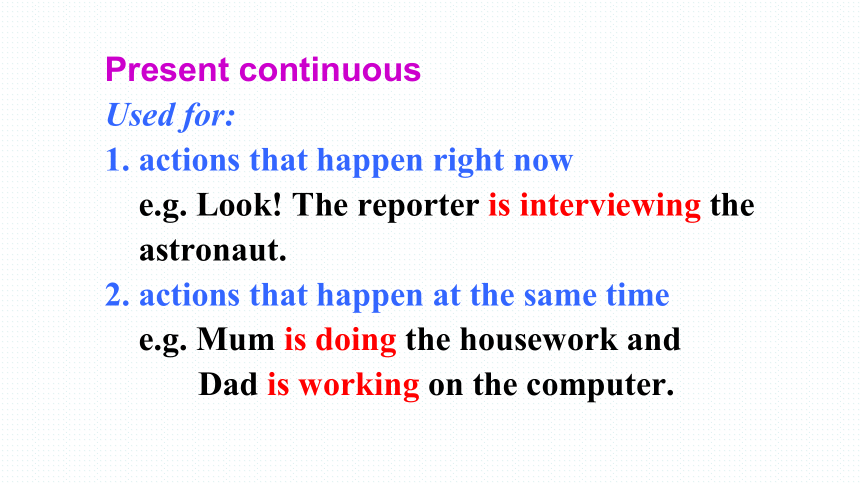
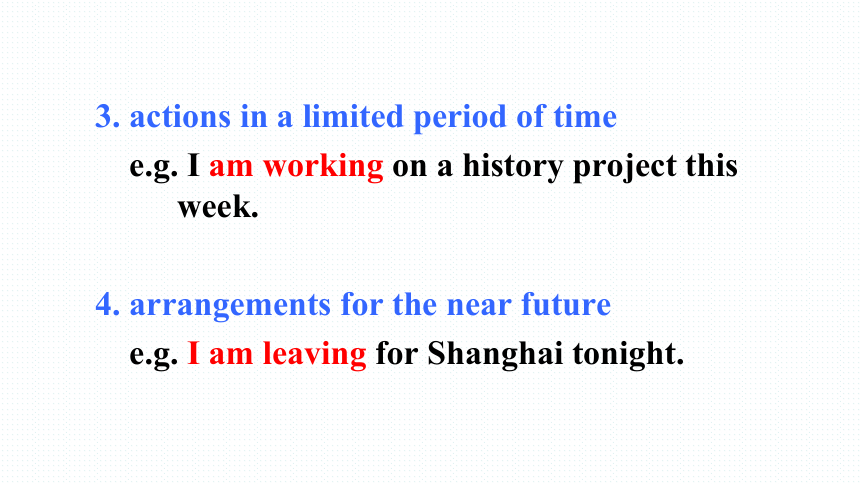
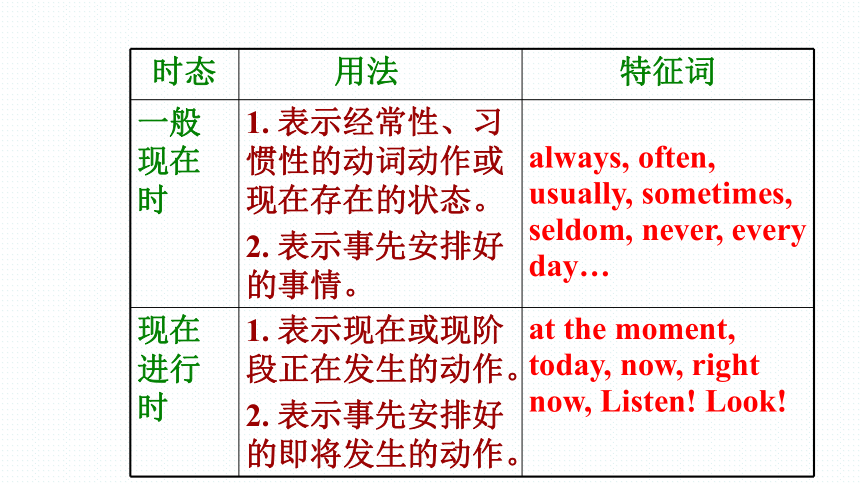
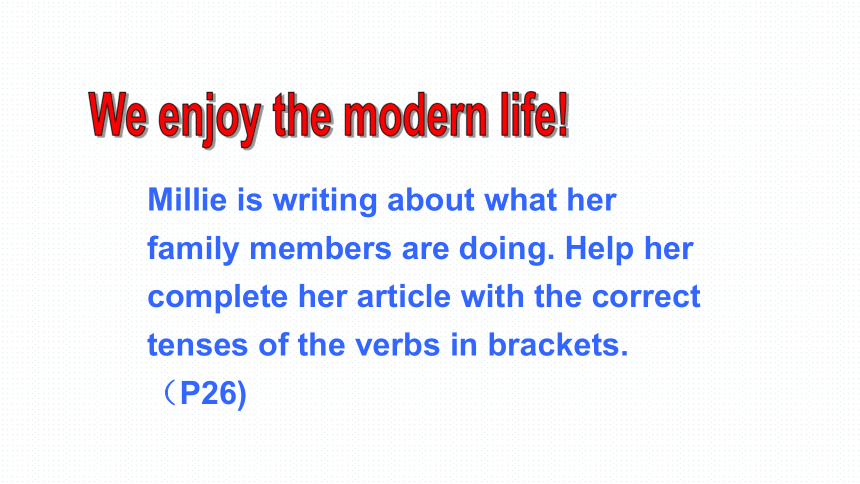
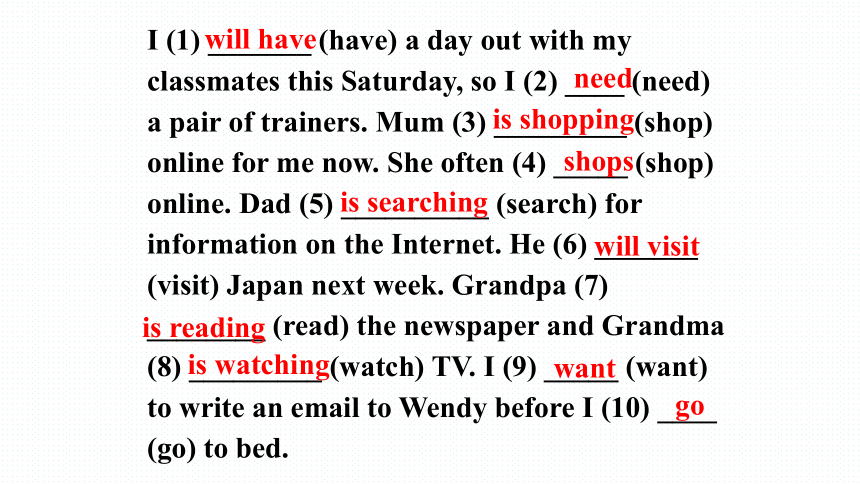
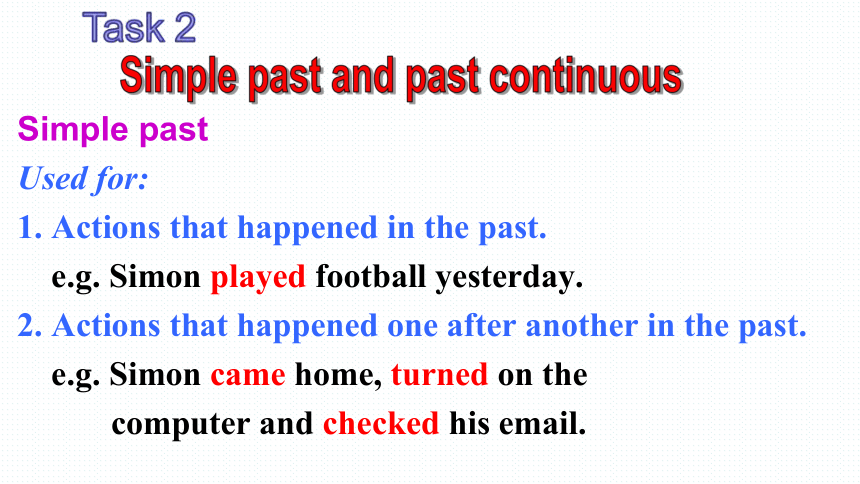
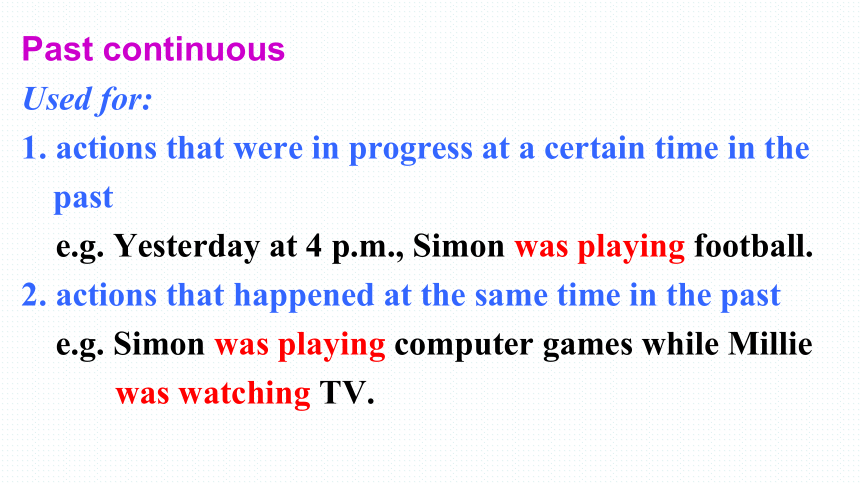
文档简介
(共31张PPT)
9下 Unit 2 Great people
1. Revise the simple present tense, the present continuous tense, the simple past tense, the past continuous tense,the simple past and the present perfect tense.
2. Sum up the differences between the simple past tense and the present perfect tense.
牛刀小试
Kitty __________(wash) the dishes twice a week.
Where’s Tim He ________________ (interview)
the astronaut.
3. Where’s Tim He ____________ (go) to the hall.
4. I was cooking when the telephone _______ (ring).
5. I’m reading while Dad ___________ (fix) his car.
6. Ten years ___________ (pass) since I came here.
7. Each of them _____________ (sing) at that time.
8. It’s cloudy outside. It _________________(rain).
9. He _________ (not fall) asleep until I got home.
10. I wonder if he ________ (hear) from his mum last week.
washes
is interviewing
has gone
rang
is fixing
has passed
was singing
is going to rain
didn’t fall
heard
Simple present
Used for:
1. a present state
e.g. John lives in New York.
2. daily routine and habits
e.g. I always go to bed at 140 p.m.
3. present actions that happen one after another
e.g. School is over and the students
go home.
4. actions set by a timetable or schedule
e.g. The talk show starts at 7 p.m.
Present continuous
Used for:
1. actions that happen right now
e.g. Look! The reporter is interviewing the
astronaut.
2. actions that happen at the same time
e.g. Mum is doing the housework and
Dad is working on the computer.
3. actions in a limited period of time
e.g. I am working on a history project this week.
4. arrangements for the near future
e.g. I am leaving for Shanghai tonight.
时态 用法 特征词
一般现在时 1. 表示经常性、习惯性的动词动作或现在存在的状态。
2. 表示事先安排好的事情。
always, often, usually, sometimes, seldom, never, every day…
现在进行时 1. 表示现在或现阶段正在发生的动作。
2. 表示事先安排好的即将发生的动作。 at the moment, today, now, right now, Listen! Look!
Millie is writing about what her family members are doing. Help her complete her article with the correct tenses of the verbs in brackets.(P26)
I (1) _______ (have) a day out with my classmates this Saturday, so I (2) ____ (need) a pair of trainers. Mum (3) _________ (shop) online for me now. She often (4) _____ (shop) online. Dad (5) __________ (search) for information on the Internet. He (6) _______ (visit) Japan next week. Grandpa (7) ________ (read) the newspaper and Grandma (8) _________ (watch) TV. I (9) _____ (want) to write an email to Wendy before I (10) ____ (go) to bed.
will have
need
is shopping
shops
is searching
will visit
is reading
is watching
want
go
Simple past
Used for:
1. Actions that happened in the past.
e.g. Simon played football yesterday.
2. Actions that happened one after another in the past.
e.g. Simon came home, turned on the
computer and checked his email.
Past continuous
Used for:
1. actions that were in progress at a certain time in the past
e.g. Yesterday at 4 p.m., Simon was playing football.
2. actions that happened at the same time in the past
e.g. Simon was playing computer games while Millie
was watching TV.
3. actions that lasted for some time in the past
e.g. We were having a meeting from
9 a.m. to 11 a.m. yesterday.
时态 用法 常用特征词
一般过去时 1. 过去发生或过去经常发生的动作。
2. 过去存在的状态。 yesterday, two years ago, last week, the other day, in 1999
过去进行时 1. 表示过去某个时刻正在发生的动作
2. 过去同一时间里同时发生的两个动作。
3. 过去一个时间段内持续发生的动作。 at this time yesterday, from… to… , last night…
Simon and his friends are talking about what they did after dinner last plete their conversation with the correct tenses of the verbs in brackets.(P27)
Simon: I (1) ____________ (watch) a wonderful football match from 7 p.m. to 8:30 p.m. yesterday. My favorite team (2) _____ (win) the match.
Millie: I (3) __________ (write) an email to Wendy at 7 p.m. yesterday. She (4) ____ (send) me an email last week.
Sandy: I (5) _____________ (practise) playing the piano the whole night. I (6) ____ (take) part in a competition this morning.
was watching
won
was writing
sent
was practising
took
Peter: Last night, I (7) ______ (find) a website about travelling in space. I (8) ___________ (read) passages on the website while you (9) ___________ (play) the piano, Sandy.
Daniel: I (10) __________ (talk) to Aunt Jane on the phone at 7:30 yesterday evening. She (11) ______ (call) me the day before yesterday, but I (12) _______ (be not) at home then.
found
was reading
were playing
was talking
called
was not
Simple past
Used for:
1. actions that happened in the past
e.g. I bought a new bicycle yesterday.
2. actions that happened at a certain time in the past
e.g. Kitty wrote an email to Linda an
hour ago.
Present perfect
Used for:
1. emphasizing the result of a past action
e.g. I have bought a new bicycle, so I
can ride to school now.
2. telling how many times an action has happened till now
e.g. She has been to the USA twice.
时态 用法 注意
一般过去时 只强调过去的动作或状态,不与现在发生联系 时态状语是过去的,yesterday, in 1998等。
现在完成时 1. 强调过去发生的动作对现在产生的结果或影响。
2. 强调过去发生的动作一直持续到现在。
3. 强调过去某个动作到现在已经发生多少次。 1. already, yet, ever, just, recently…
2. 在肯定句中与“since +过去点时间、for +段时间”连用时,谓语动词必须是延续性动词。
非延续性动词 延续性动词
buy
open
close
begin/ start
come
go
finish
die
join
get married
have
keep
be open
be on
be here
be there
be over
be dead
be in … / be a member of…
been married
e.g. I lived in Sunshine Town three years ago.
(一般过去时不强调现在的情况)
我三年前住在阳光镇。
He has lived in Sunshine Town since he was born.
(表示他现在还住在阳光镇)
他自出生就生活在阳光镇。
The film has started for over ten minutes. (误)
The film has been on for over ten minutes. (正)
电影已经开始十多分钟了。
注:与for, since等表示从过去到现在的时间段连用时,肯定句中要用延续性动词)
Millie is writing about some modern inventions that have changed the way we live. Help her choose the correct words in brackets to complete her article.(P28)
Many modern inventions (1) __________ (make/ have made) a great difference in out life. They (2) ____________ (changed/ have changed) the way we live.
In ancient times, people (3) _____ (used/ have used) salt to help them keep fish or meat for a longer time. Fresh food would go bad in summer in a few hours. The invention of fridge (4) _________ (solved/ has solved) this problem.
have made
have changed
used
has solved
In the past, people (5) _______ (washed/ have washed) their clothes by hand. It (6) ____ (was/ has been) tiring, and it (7) _____ (took/ has taken) a lot of time. With the invention of the washing machine, people (8) _________ (had/ have had) more time to relax.
In the old days, people (9) ________ (travelled/ have travelled) by ship. Now planes (10) _________ (made/ have made) journeys more comfortable.
washed
was
took
have had
travelled
have made
I won’t see the film with you because I
_________(see) it already.
2. Great changes ________________(take place)
in our country since 1978.
3. Jim isn’t here. He ________(go) to the library.
4. –How long _____you ____(买) the bike
5. The Greens ___________(来)China for 5 years.
6. They ___________ in 2000.
They ________________for 15 years. (结婚)
have seen
have taken place
has gone
have
had
have been in
got married
have been married
用所给动词填空
Test 1
1.—What is your brother going to be when he _____
--He is going to be a doctor.
A. grew up B. grows up C. grow up D. growing up
2. Please call me as soon as you ______ to Beijing.
A. will get B. gets C. get D. getting
3.– My mother is cooking while I _______my homework.
A. am doing B. was doing C. do D. did
4. Li Ming ______ the bedroom. He is sleeping.
cleans B. isn’t cleaning C. is cleaning D. cleaned
5. He told me he ___the Great Wall soon.
A. will visit B. would visit C. visit D. visit
Test 2
6. – Has your brother completed his design
- Not yet. He_____ on it last night.
A. worked B. has worked
C.was working D. had worked
7. The teacher told us yesterday that December 25 ______Christmas Day.
A. is B. was C. has been D. would be
8. – Do you think grandpa and grandma____ late
– No, the train is usually on time.
A. were B. will be C. was D. have been
9下 Unit 2 Great people
1. Revise the simple present tense, the present continuous tense, the simple past tense, the past continuous tense,the simple past and the present perfect tense.
2. Sum up the differences between the simple past tense and the present perfect tense.
牛刀小试
Kitty __________(wash) the dishes twice a week.
Where’s Tim He ________________ (interview)
the astronaut.
3. Where’s Tim He ____________ (go) to the hall.
4. I was cooking when the telephone _______ (ring).
5. I’m reading while Dad ___________ (fix) his car.
6. Ten years ___________ (pass) since I came here.
7. Each of them _____________ (sing) at that time.
8. It’s cloudy outside. It _________________(rain).
9. He _________ (not fall) asleep until I got home.
10. I wonder if he ________ (hear) from his mum last week.
washes
is interviewing
has gone
rang
is fixing
has passed
was singing
is going to rain
didn’t fall
heard
Simple present
Used for:
1. a present state
e.g. John lives in New York.
2. daily routine and habits
e.g. I always go to bed at 140 p.m.
3. present actions that happen one after another
e.g. School is over and the students
go home.
4. actions set by a timetable or schedule
e.g. The talk show starts at 7 p.m.
Present continuous
Used for:
1. actions that happen right now
e.g. Look! The reporter is interviewing the
astronaut.
2. actions that happen at the same time
e.g. Mum is doing the housework and
Dad is working on the computer.
3. actions in a limited period of time
e.g. I am working on a history project this week.
4. arrangements for the near future
e.g. I am leaving for Shanghai tonight.
时态 用法 特征词
一般现在时 1. 表示经常性、习惯性的动词动作或现在存在的状态。
2. 表示事先安排好的事情。
always, often, usually, sometimes, seldom, never, every day…
现在进行时 1. 表示现在或现阶段正在发生的动作。
2. 表示事先安排好的即将发生的动作。 at the moment, today, now, right now, Listen! Look!
Millie is writing about what her family members are doing. Help her complete her article with the correct tenses of the verbs in brackets.(P26)
I (1) _______ (have) a day out with my classmates this Saturday, so I (2) ____ (need) a pair of trainers. Mum (3) _________ (shop) online for me now. She often (4) _____ (shop) online. Dad (5) __________ (search) for information on the Internet. He (6) _______ (visit) Japan next week. Grandpa (7) ________ (read) the newspaper and Grandma (8) _________ (watch) TV. I (9) _____ (want) to write an email to Wendy before I (10) ____ (go) to bed.
will have
need
is shopping
shops
is searching
will visit
is reading
is watching
want
go
Simple past
Used for:
1. Actions that happened in the past.
e.g. Simon played football yesterday.
2. Actions that happened one after another in the past.
e.g. Simon came home, turned on the
computer and checked his email.
Past continuous
Used for:
1. actions that were in progress at a certain time in the past
e.g. Yesterday at 4 p.m., Simon was playing football.
2. actions that happened at the same time in the past
e.g. Simon was playing computer games while Millie
was watching TV.
3. actions that lasted for some time in the past
e.g. We were having a meeting from
9 a.m. to 11 a.m. yesterday.
时态 用法 常用特征词
一般过去时 1. 过去发生或过去经常发生的动作。
2. 过去存在的状态。 yesterday, two years ago, last week, the other day, in 1999
过去进行时 1. 表示过去某个时刻正在发生的动作
2. 过去同一时间里同时发生的两个动作。
3. 过去一个时间段内持续发生的动作。 at this time yesterday, from… to… , last night…
Simon and his friends are talking about what they did after dinner last plete their conversation with the correct tenses of the verbs in brackets.(P27)
Simon: I (1) ____________ (watch) a wonderful football match from 7 p.m. to 8:30 p.m. yesterday. My favorite team (2) _____ (win) the match.
Millie: I (3) __________ (write) an email to Wendy at 7 p.m. yesterday. She (4) ____ (send) me an email last week.
Sandy: I (5) _____________ (practise) playing the piano the whole night. I (6) ____ (take) part in a competition this morning.
was watching
won
was writing
sent
was practising
took
Peter: Last night, I (7) ______ (find) a website about travelling in space. I (8) ___________ (read) passages on the website while you (9) ___________ (play) the piano, Sandy.
Daniel: I (10) __________ (talk) to Aunt Jane on the phone at 7:30 yesterday evening. She (11) ______ (call) me the day before yesterday, but I (12) _______ (be not) at home then.
found
was reading
were playing
was talking
called
was not
Simple past
Used for:
1. actions that happened in the past
e.g. I bought a new bicycle yesterday.
2. actions that happened at a certain time in the past
e.g. Kitty wrote an email to Linda an
hour ago.
Present perfect
Used for:
1. emphasizing the result of a past action
e.g. I have bought a new bicycle, so I
can ride to school now.
2. telling how many times an action has happened till now
e.g. She has been to the USA twice.
时态 用法 注意
一般过去时 只强调过去的动作或状态,不与现在发生联系 时态状语是过去的,yesterday, in 1998等。
现在完成时 1. 强调过去发生的动作对现在产生的结果或影响。
2. 强调过去发生的动作一直持续到现在。
3. 强调过去某个动作到现在已经发生多少次。 1. already, yet, ever, just, recently…
2. 在肯定句中与“since +过去点时间、for +段时间”连用时,谓语动词必须是延续性动词。
非延续性动词 延续性动词
buy
open
close
begin/ start
come
go
finish
die
join
get married
have
keep
be open
be on
be here
be there
be over
be dead
be in … / be a member of…
been married
e.g. I lived in Sunshine Town three years ago.
(一般过去时不强调现在的情况)
我三年前住在阳光镇。
He has lived in Sunshine Town since he was born.
(表示他现在还住在阳光镇)
他自出生就生活在阳光镇。
The film has started for over ten minutes. (误)
The film has been on for over ten minutes. (正)
电影已经开始十多分钟了。
注:与for, since等表示从过去到现在的时间段连用时,肯定句中要用延续性动词)
Millie is writing about some modern inventions that have changed the way we live. Help her choose the correct words in brackets to complete her article.(P28)
Many modern inventions (1) __________ (make/ have made) a great difference in out life. They (2) ____________ (changed/ have changed) the way we live.
In ancient times, people (3) _____ (used/ have used) salt to help them keep fish or meat for a longer time. Fresh food would go bad in summer in a few hours. The invention of fridge (4) _________ (solved/ has solved) this problem.
have made
have changed
used
has solved
In the past, people (5) _______ (washed/ have washed) their clothes by hand. It (6) ____ (was/ has been) tiring, and it (7) _____ (took/ has taken) a lot of time. With the invention of the washing machine, people (8) _________ (had/ have had) more time to relax.
In the old days, people (9) ________ (travelled/ have travelled) by ship. Now planes (10) _________ (made/ have made) journeys more comfortable.
washed
was
took
have had
travelled
have made
I won’t see the film with you because I
_________(see) it already.
2. Great changes ________________(take place)
in our country since 1978.
3. Jim isn’t here. He ________(go) to the library.
4. –How long _____you ____(买) the bike
5. The Greens ___________(来)China for 5 years.
6. They ___________ in 2000.
They ________________for 15 years. (结婚)
have seen
have taken place
has gone
have
had
have been in
got married
have been married
用所给动词填空
Test 1
1.—What is your brother going to be when he _____
--He is going to be a doctor.
A. grew up B. grows up C. grow up D. growing up
2. Please call me as soon as you ______ to Beijing.
A. will get B. gets C. get D. getting
3.– My mother is cooking while I _______my homework.
A. am doing B. was doing C. do D. did
4. Li Ming ______ the bedroom. He is sleeping.
cleans B. isn’t cleaning C. is cleaning D. cleaned
5. He told me he ___the Great Wall soon.
A. will visit B. would visit C. visit D. visit
Test 2
6. – Has your brother completed his design
- Not yet. He_____ on it last night.
A. worked B. has worked
C.was working D. had worked
7. The teacher told us yesterday that December 25 ______Christmas Day.
A. is B. was C. has been D. would be
8. – Do you think grandpa and grandma____ late
– No, the train is usually on time.
A. were B. will be C. was D. have been
